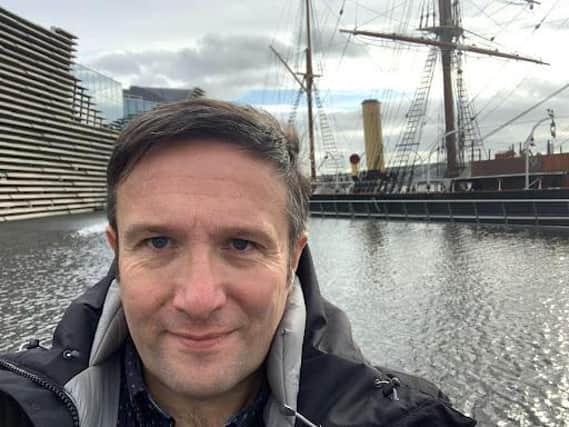COP26 travel blog: Dundee’s pivot to renewable energy economy


Dundee has long been an inspiring contrast of the old and the new; the juxtaposition of RRS Discovery with the V&A and the all-new whale sculpture are clear examples of that.
More recently it has emerged as an important player in the renewable energy sector, its workforce building and launching the world’s most powerful tidal turbine while the river Tay plays temporary host to the giant foundation jackets used in offshore wind.
Yet councillor Steven Rome, Dundee Council’s Deputy Convenor for City Development, says it is that breadth of variety which helps the city reinvent itself.
“There’s the mindset change”, he says, “Then the physical things. In terms of mindset, we’re a very ambitious council and we’re very fortunate to have ambitious officers that back us up, who are keen to see the changes we want to see as well.
“We have two world class universities on our doorstep that are driving with brainpower, we’ve got the infrastructure, and we’ve got the Michelin Scotland Innovation Park which the city is partner in which is going to house these businesses of the future that are really doing world leading stuff.
“And that’s the entire point - to bring new technologies to our doorstep that we can then expand on and grow which brings with it benefits in terms of carbon reduction, but also importantly, jobs for the city.”
Yet the job of the council is to balance these ambitions with caring for its residents in a city which, like others, is dealing with fuel poverty and other social problems.
“These things are complex, it’s not just carbon reduction, it’s also about combating these deep-seated issues and one of the things we find is that fuel poverty has been a massive issue not just in Dundee but throughout Scotland.”
While tech like smart meters can help people save money by providing accurate bills and allowing them to check their energy costs in near-real time, he says a whole host of work is going on to improve the properties themselves.
“Investing in external wall insulation, that makes a huge difference in terms of making these properties more fuel efficient and reducing fuel poverty for citizens in Dundee,” he adds.
He also remains hopeful that Dundonians will rise to the climate challenge. He said: “I think everyone realises the difficulties we face as a planet, not just a city, and I think everyone will want to play a part.”
Playing a part is key to what motivates Gary Hayes. As Managing Director of Denny based CampervanCo he is pioneering cleaner travel, the kind of innovation that has made my trip possible using the eco-friendly tribrid van he sold me three years ago.
But he says it is a race against time.
“Right now, we know what we’re moving towards the deadline for 2030 and we know we need to reduce our pollution and we need to reduce our carbon footprint. More and more people are starting to wake up to this,” he explains.
“We see hybrids as a step towards the final goal of net zero emissions. We, as a company, have set ourselves the goal to design, build, and bring to the market a zero emissions recreational vehicle a full five years ahead of the government’s target of 2030.
“There’s about half a million recreational vehicles in the UK and we reckon with this technology, we could be reducing the footprint by about 1.2 million tonnes of CO2 over the next ten years, if we start looking at not just reducing the carbon we use in driving, but also while stationary.
“Nobody’s really been looking at this, but we’ve got diesel heaters, we’ve got gas heaters, we’ve got various other types of heaters. What we’re looking at is zero emission heating and cooking on site.
“You go to beautiful areas, you go to areas which are vulnerable, you want to get to the areas of natural beauty so what we want is that when the vehicles get there, they aren’t going to start polluting which currently is the case.”
Join the energy revolution. Search: “Get a smart meter”.